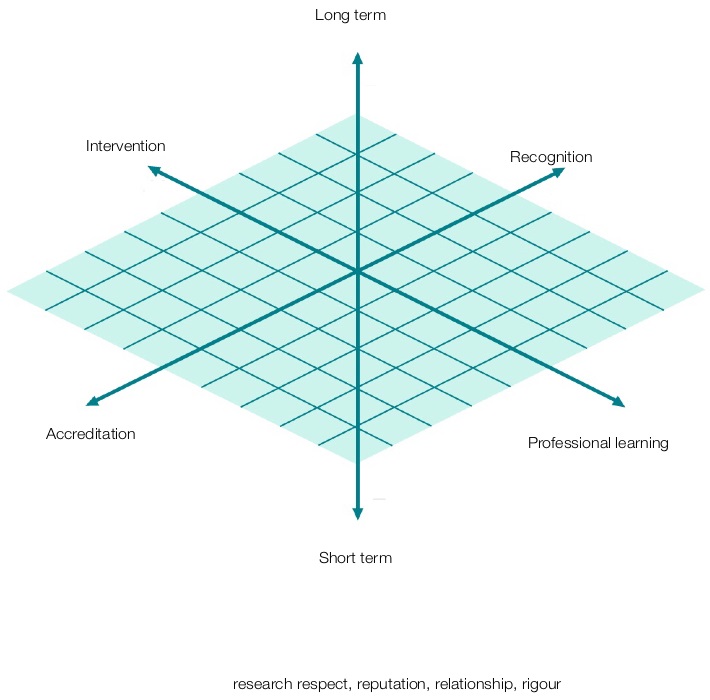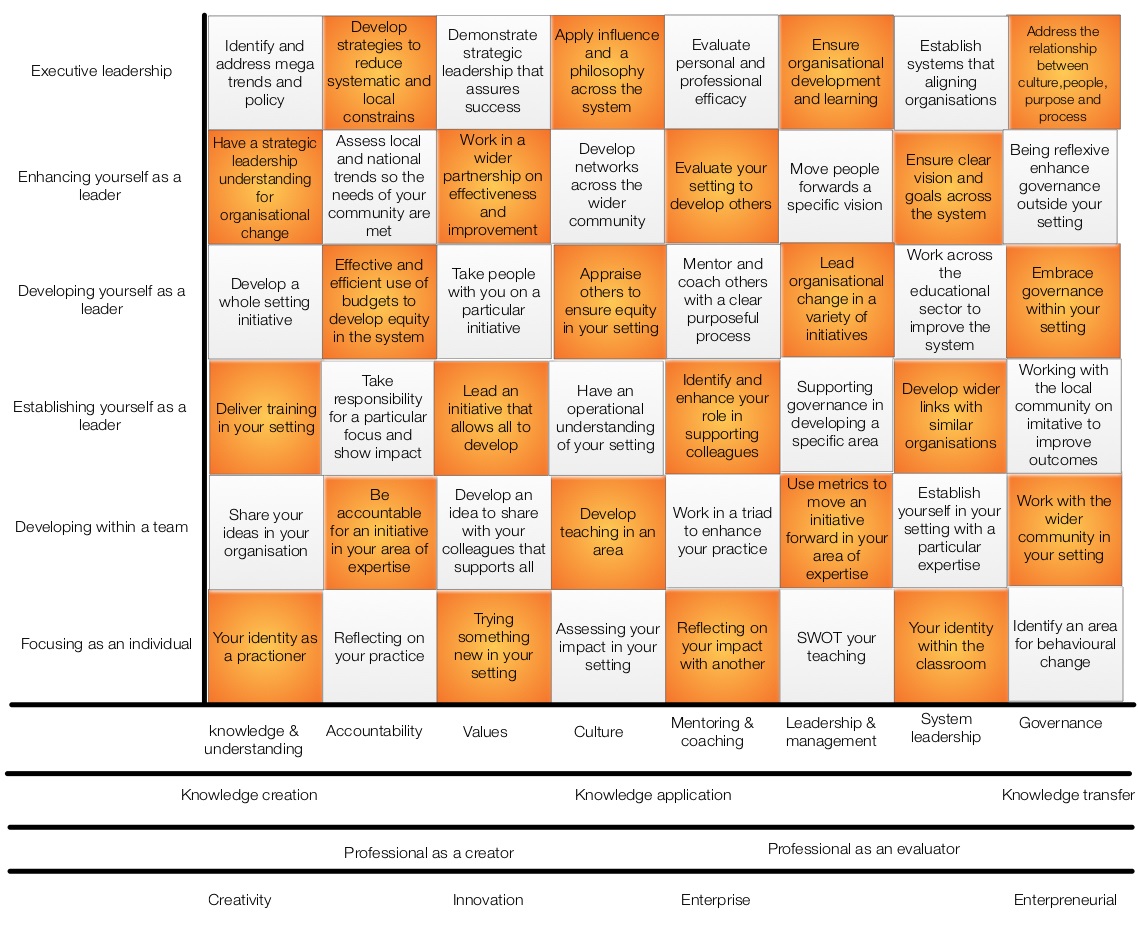Supporting, Enhancing and Sustaining School Effectiveness and School Improvement
Professional Development and Learning
In education, research has shown that teaching quality and school leadership are the most important factors in raising student achievement. For teachers and Schools to be as effective as possible, they need to continually expand their knowledge, skills and understanding to implement the best educational practices.
Continuing professional development is important because it ensures you continue to be competent in your profession. It is an ongoing process and continues throughout a professional’s career.
Well crafted and delivered continuing professional development is important because it delivers benefits to the individual, their profession and the organisation.
Our CPD offer can range of themes from intervention to professional learning, accreditation to non-accreditation and short to long term.

Learning Development Programmes can be presented as an accredited course (Level 7, 20 credits) or can be used as part of a non-assessed professional development opportunity. It is led by a leading practitioner from the Institute of Education from the University of Wolverhampton. We recommend the number of key sessions to achieve the learning outcomes and suggest that learning action sets are formed to maximize impact on pupil outcomes, depending on a need analysis. The length and timing of each session can be negotiated. However, where priorities are identified by the school a bespoke menu of non-accredited programmes can also be arranged.
Our CPD offer whether it is a well-established programme or our bespoke programmes allow individuals through to executive leaders to develop their knowledge and skills across a spectrum of pathways leading to positive change for themselves, schools and their pupils.

|
Areas of Possible Interest for Professional Learning and Research |
|
|
Coaching and Mentoring |
Adolescence |
| Behaviour for Learning | KS2/3 Transition |
| SEND | Curriculum theory, design and evaluation |
| EAL | Assessment |
| Language for Learning and thinking skills | Evidence-informed practice |
| E-safety | Critical Reflection |
| Pastoral Care: role of tutor | Education policy |
| Mathematics/English across the curriculum | High attainers |
| Intervention | Vulnerable groups |
| SMSC and British Values | Effective use of Data |
| Character Education | Pupil health, wellbeing and resilience |
| Citizenship, social justice and globalisation | Governance |
| Learning Theory | |
"The course was delivered to a high standard ....They have also understood the particular challenges of completing a course, at this level, for teachers, all of whom were senior or middle leaders in their schools. Course tutors ensured that the face to face sessions were interesting, that they engaged the professional curiosity of the participants and encouraged them to learn more deeply and broadly about areas they had felt they had already some understanding.
Course tutors effectively supported participants to re-engage with independent research based learning. Materials supplied were of good quality, access to research papers through the University library was excellent - especially through online facility."
Solihull Local Authority.
Due to the wide range of expertise in the institute of education we can offer a wider range of professional learning and development. Some examples of learning and development opportunities within our broad offer, include:Effective Assessment for Learning - exploring strategies to develop quality first teaching and high quality learning opportunities.
Effective Assessment for Learning - exploring strategies to develop quality first teaching and high quality learning opportunities
Target Audience: Classroom Practitioners, Subject Leaders, HLTA & Para-professionals
Example of Intended Outcomes
- Demonstrate comprehensive knowledge and understanding of how assessment influences pupil learning.
- Demonstrate the key principles, process and outcomes with respect to assessment with respect to international/national/local/school contexts, with a particular emphasis on professional judgment and assessments.
- Focussing on key specific aspects of assessment (e.g. learning objectives, feedback, questioning, etc.) demonstrate how the programme you have undertaken has impacted on children’s learning.
- Demonstrate how this enhanced understanding has supported a coherent standardised approach to assessment and moderation within school and locally.
- Demonstrate how your knowledge and practice have been enhanced as a result of critically reviewing literature about assessment.
Developing teaching assistants: English and Mathematics subject knowledge
Target Audience: HLTA & Para-professionals
Intended goals
A) secure knowledge and understanding of:
- the aims, principles and content of a core curriculum appropriate to the ability and age range they support;
B) the ability to:
- reflect on their own practice and that of others to improve their teaching and the children’s learning.
- analyse critically;
- think critically and evaluate;
- communicate effectively (at appropriate levels in oral, visual and written forms) with children, colleagues and other key stakeholders
- gather information and utilise it effectively to support their own and others’ learning;
Subject specific
Mathematics
- To demonstrate knowledge and understanding of the underlying mathematical and educational theories that relate to the key concepts and ideas introduced and explored within the module.
- To demonstrate knowledge and understanding on how make use of their subject and pedagogic knowledge to plan an effective numeracy lesson and to address children’s mathematical misconceptions
- To demonstrate knowledge and understanding of the underlying mathematical theories that relate to the key concepts
English
- To demonstrate an understanding of relevant subject knowledge (reading, writing, speaking, listening, text – poetry/narrative, and the learning environment) and of the national documentation
- To demonstrate knowledge and understanding of English in relation to child development such as emergent reading and writing and the practical application of phonics
- To demonstrate an understanding of language communities and a knowledge about language.
Leaders that Aspire and Inspire through Research - exploring effective leadership which impacts on pupil outcomes
Target Audience: Senior Leader, Middle leaders, Subject Leaders
Intended goals
To review the use of research to support practice
- To reflect upon leader identity
- To understand a learning community
- To appreciate learner centric leadership
- To reflect upon leadership and role of national standards
- To ensure the nature of leadership develops continuous improvement
Collaborative Researchers
Target Audience: All staff
This short course is targeted at those who have already completed their Master’s or a higher qualification but who would like to engage in research and commit to an evidence informed approach to their teaching.
Each collaborative researcher will be invited to an initial workshop at the University and research triads will be formed and a pathway agreed. Each triad will have a lead researcher from the Institute who will guide the group on ethics, research methods and outcomes. We will work with you to develop collaborative publications.
We know that high quality teaching and learning is rooted in a deep understanding of pedagogy and practice, the ability to articulate this and make changes to practice. We know that research and sharing best practice can improve student outcomes and we are committed to working with our school based colleagues to provide the very best information about the most effective practice.
Developing Pedagogical Content Knowledge
Target Audience: All teaching staff
Example of Intended Outcomes
Pedagogical content knowledge programme will focus on
- the type of knowledge that is unique to each subject teacher
- how teachers relate their pedagogical knowledge (what they know about teaching) to their subject matter knowledge (what they know about what they teach)
- how to ensure progression through cognitive load, motivation, understanding and knowledge of the subject matter


/prod01/wlvacuk/media/departments/digital-content-and-communications/images-2024/240328-Varsity-Line-Up-Resized.jpg)
/prod01/wlvacuk/media/departments/digital-content-and-communications/images-18-19/220325-Engineers_teach_thumbail.jpg)
/prod01/wlvacuk/media/departments/digital-content-and-communications/images-2024/240404-Digital-Humanities-Training-Resized.jpg)
/prod01/wlvacuk/media/departments/digital-content-and-communications/images-2024/240320-Uzbekistan-Resized.jpg)
/prod01/wlvacuk/media/departments/digital-content-and-communications/images-2024/240229-The-Link-Resized.jpg)
/prod01/wlvacuk/media/departments/digital-content-and-communications/images-2024/240411-IYC-Resized.jpg)